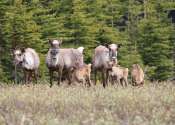Scientists assess paths toward maintaining BC caribou until habitat recovers
Thanks to drastic and evidence-based solutions, more southern mountain caribou roam Western Canada today than in previous decades; however, herd numbers are too fragile to sustain themselves without continued intervention.









